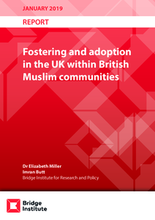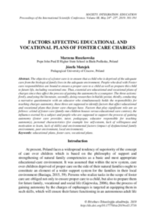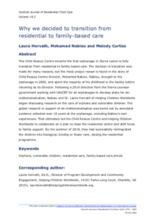Displaying 971 - 980 of 2221
This analysis examines both historical and contemporary approaches to addressing religion and race in child welfare policy and practice, with a particular focus on adolescent youth.
This study explored the personal self-care practices of foster parents in one southeastern state in the US.
This exploratory, qualitative, multi-case study sought to understand, from the perspective of successful foster alumni college students, the role and influence of family members.
This report examines the challenging relationship between Islam and fostering and adoption in the UK, and efforts currently being made to address it.
In this study, the authors analyzed the literature on foster care in Poland and conducted a narrative questionnaire with an educator who simultaneously holds the responsibility for teaching youth in foster care autonomy in order to identify factors that affect educational and vocational plans that foster care charges have.
This paper from the Scottish Journal of Residential Child Care outlines the Child Rescue Centre's process of transitioning from residential care to family-based care in Sierra Leone.
This thesis is concerned with the overrepresentation of black and minority ethnic (BME) children and looked after children, in the youth justice system in general and the secure state in particular, in England and Wales.
This article gives specific information on a program in Missouri, USA that took the emerging therapeutic foster family approach and added a novel component: training deaf families to become therapeutic foster parents, including how it was established, what problems arose, and what solutions were tried.
This volume provides readers around the globe with a focused and comprehensive examination of how to prevent and respond to child maltreatment using evidence-informed public health approaches and programs that meet the needs of vulnerable children, and struggling families and communities. Detailed guidance is provided about how to re-think earlier intervention strategies, and establish stronger and more effective programs and services that prevent maltreatment at the population level.
This study explores the social work role with children in long-term care, focusing on how relationships between children and social workers can support wellbeing.



